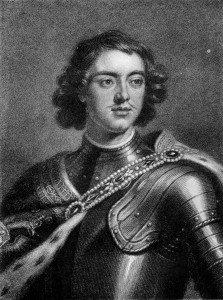Peter the Great was a formidable leader, creating an era of heavy changes in Russia as it began to Westernize through his multiple reforms. However, the majority of his reforms tend to focus on social hierarchy and importance of having or obtaining a title for oneself. For example, the Table of Ranks “expressed new definitions of nobility and opened up new avenues of achieving it” ((Kaiser and Marker 228)) in order to suppress the boyars and other nobility from the previous years. Peter the Great desire to create different ways to either obtain nobility or move up the social ladder can be understood as a way to get rid of the old system set in place or as a way to implement western culture in Russian life through the notion of the class system.
Through the enforcement of the Table of Ranks, the chin system was set in place, a “system of rank ordering and niche assignment” ((Kaiser and Marker 232)) . This rank-ordering system created a competition within the people of Russia to try and be the closest to the tsar; the Table of Ranks made it clear how all offices were to interact with each other. Even more importantly, the Table of Ranks “indicated [the officer’s] proximity to the Emperor” (Kaiser and Marker 233). Peter the Great also created ways to give certain people positions higher up in the office, through “birth, time spent in office, or because of skills or actions valued by the Emperor” (Kaiser and Marker 234). Peter the Great’s reforms focused heavily on establishing a social hierarchy in order to continue Westernizing Russia.
https://www.google.com/search?site=imghp&tbm=isch&q=peter%20the%20great&tbs=sur:fmc#imgrc=C1V2q0Y4Nn4MuM%3A

